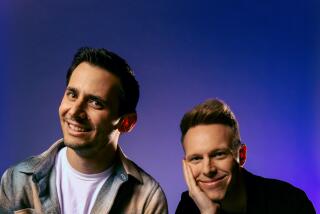‘Silicon Valley’s’ cast chemistry breaks the code for Emmy success
- Share via
HBO’s “Silicon Valley” thrives on low-key, cynical pleasures depicting a kind of acrostic poem that seems to always spell humor. With its third Emmy nomination for a comedy series in as many seasons, you don’t have to look far to understand why it’s working with audiences and voters.
“I think casting is a big part of the success,” says co-creator Mike Judge. “That was the first step, and then seeing how the characters interact started to influence the writing. What’s nice is I feel like we’re hitting our stride knowing them and everything is firing on all cylinders.”
At the show’s nucleus is Pied Piper founder Richard Hendricks, played by Thomas Middleditch, who’s grown from an idealistic, bumbling computer programmer to a passionate CEO willing to fight for his data-compression start-up collectively worked on by Jared (Zach Woods), Gilfoyle (Martin Starr), Dinesh (Kumail Nanjiani) and Erlich Bachman (T.J. Miller).
For Judge and the writers, the comedy comes from putting the characters into situations where they would be fun to watch. “There are a lot of things we try and fail at before what you see on TV happens. It’s more about trial and error,” he says. “But we try to not change them so much so you’re not eating your seed corn.”
Middleditch notes, “The writers do a lot of research, talking to legit companies and venture capitalists to make it as real as it can be. No one is doing the simplified version of whatever is going on.” The series even had Stanford professors researching the anatomical joke at the end of Season 1, he adds.
That grounding in reality, and the chemistry of the cast — even as they attack each other in character — seems to be the magic formula for the show.
Middleditch and Miller have known each other for over a decade and Nanjiani and Starr are friends off set. The same is said for Middleditch and Nanjiani having roots in Chicago’s comedy scene.
“I think Martin and I being close friends helps a lot when something isn’t working,” says Nanjiani. “When we’re running lines we always pitch stuff and Martin will say something like, ‘Start walking to this point and we’ll try a bunch of different things to see what feels right.’ Knowing each other so well, we can add a good amount of subtlety to the Gilfoyle-Dinesh dynamic, which I like best when we team up on someone.”
The cast’s understanding of their characters certainly contributed to the series’ success, with Season 3 reportedly being the most watched of the series to date with 6.7 million viewers per episode.
“Our cast comes from stand-up or improv and we’re all pretty analytical and technical about humor, and it was decided from the onset that the tone should be something grounded,” says Middleditch, who’s been nominated in the lead actor comedy category for the first time. “Like any good character, Richard is imperfect. When he fights back, he usually falls flat on his face. When he tries to do the right thing, it bites him in his ass. It’s not like he’s Heisenberg in ‘Breaking Bad,’ He’s not going to be shooting and putting people in body bags. He’s navigating this whole thing while still trying to be a good guy the entire time. That’s really the show – Pied Piper starts to puff its chest then someone comes along and pops it.”
For his part, Woods, who plays the show’s most self-deprecating character, admires Jared’s attitude. “Everyone has these little different nuances about them. In character, we can be very aggressive toward one another, and for Jared, I feel like he’s endlessly resilient and optimistic even well past the point of what a normal person can endure. He’s still sort of mildly smiling, no matter how mean the other guys are to him. He’s like one of those inflatable clowns with the sand on the bottom. You punch them and they come back with this benign grin.”
Even plot points of character growth are not untouched by snark. “Dinesh has an internal struggle about who he is and what he stands for. I think he’s always trying to figure who he’s loyal to and what he wants in his career and life,” Nanjiani says. “With Jared, he’s loyal to the company. Erlich, he’s loyal to himself. But with Dinesh, I think he struggles to know what he stands for. He wants success, of course, but feels loyal to Richard. So when Dinesh is [denigrating] Richard, he’ll say good stuff before saying the bad stuff. He really feels guilt about being bad.”
calendar@latimes.com
More to Read
From the Oscars to the Emmys.
Get the Envelope newsletter for exclusive awards season coverage, behind-the-scenes stories from the Envelope podcast and columnist Glenn Whipp’s must-read analysis.
You may occasionally receive promotional content from the Los Angeles Times.







